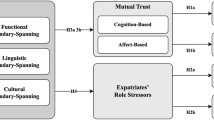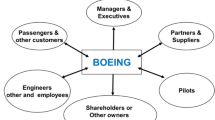Abstract
Although much theoretical and empirical research has examined organizational power, virtually none has addressed the hierarchical abuse of power in organizations. Managers' incentives and discretion and subordinates' dependencies define the abuse of power as an important organizational issue. This paper offers a conceptualization and process model to help further theoretical and applied understanding, and it considers the ethical nature of power abuse. Two dimensions, disrespect for individual dignity and interference with job performance or deserved rewards, conceptualize the interpersonal abuse of power. Behavioral examples of each dimension are provided.
The process model delineates powerholders' motives to abuse power and indicates individual attributes that increase the probability of their pur-suing these motives. Organizational conditions that allow or encourage the abuse of power and managers' particular sources of power interact with these motives and attributes to define decisions about abusing power. Norms and considerations of risk influence these decisions. The decision to abuse power leads to the enactment of power strategies, and they generate intended and unintended outcomes. The process model presented here recognizes an emotional component of the hierarchical abuse of power.
Similar content being viewed by others
References
Acton, L.: 1979, The Oxford Dictionary of Quotations (Oxford University Press, New York) Originated in letter dated April 5, 1887 to Bishop Mandrell Creighton.
Allen, R. and L. Porter: 1983, Organizational Influence Processes (Scott, Foresman, Glenview).
Astley, W. and P. Sachdeva: 1984, ‘Structural Sources of Intraorganizational Power: A Theoretical Synthesis’, Academy of Management Review 9, 104–113.
Blake, R. and J. Mouton: 1964, The Managerial Grid (Gulf Publishing, Houston).
Blanchard, K. and N. Peale: 1988, The Power of Ethical Management (William Morrow, New York).
Boeker, W.: 1989, ‘The Development and Institutionalization of Subunit Power in Organizations’, Administrative Science Quarterly 34, 388–410.
Brass, D. and M. Burkhardt: 1993, ‘Potential Power and Power Use: An Investigation of Structure and Behavior’, Academy of Management Journal 36, 441–470.
Cristie, R. and F. Geis: 1970, ‘Studies in Machiavellianism’ (Academic Press, New York).
Clegg, S.: 1983, ‘Organizational Democracy, Power and Participation’, in C. Crouch and F. Heller (eds.), International Yearbook of Organizational Democracy (Wiley, New York), pp. 3–34.
Conger, J. and R. Kanungo: 1988, ‘The Empowerment Process: Integrating Theory and Practice’, Academy of Management Review 13, 471–482.
Dansereau, F., J. Alutto and F. Yammarino: 1984, Theory Testing in Organizational Behavior: The Varient Approach (Prentice-Hall, Englewood Cliffs).
Emerson, R.: 1962, ‘Power-dependence Relations’, American Sociological Review 27, 31–41.
Goleman, D.: December 28, 1986, ‘When the Boss is Unbearable’, New York Times (New York Times Publishing Company, New York).
Grossberg, S. and W. Gutowski: 1987, ‘Neural Dynamics of Decision Making Under Risk: Affective Balance and Cognitive-emotional Interactions’, Psychological Review 94, 300–318.
Heisler, W. and J. Houck: 1977, A Matter of Dignity: Inquiries into the Humanization of Work (University of Notre Dame Press, South Bend).
House, R.: 1988, ‘Power and Personality in Complex Organizations’, in B. Staw and L. Cummings (eds.), Research in Organizational Behavior (JAI Press, Greenwich), pp. 305–357.
House, R. and M. Baetz: 1979, ‘Leadership: Some Empirical Generalizations and New Research Directions’, in Staw, B. (ed.), Research in Organizational Behavior (JAI Press, Greenwich), pp. 341–423.
Kipnis, D.: 1972, ‘Does Power Corrupt?’, Journal or Personality and Social Psychology 24, 33–41.
Kipnis, D., S. Schmidt and I. Wilkinson: 1980, ‘Intraorganizational Influence Tactics: Explorations in Getting One's Way’, Journal of Applied Psychology 65, 440–452.
Kipnis, D.: 1984, ‘The Use of Power in Organizations and in Interpersonal Settings’, in S. Oskamp (ed.), Applied Social Psychology Annual (Prentice-Hall, Englewood Cliffs), pp. 179–210.
Kirkpatrick, S. and E. Locke: 1991, ‘Leadership: Do Traits Matter?’, Academy of Management Executive 5, 48–60.
Kotter, J.: 1985, Power and Influence (Free Press, New York).
Langley, A.: 1989, ‘In Search of Rationality: The Purposes Behind the Use of Formal Analysis in Organizations’, Administrative Science Quarterly 34, 598–632.
Lewin, K.: 1945, ‘The Research Center for Group Dynamics at Massachusetts Institute of Technology’, Sociometry 8, 126–136.
Loverd, R.: 1989, ‘The Challenge of a More Responsible, Productive Public Workplace’, Public Productivity and Management Review 13, 43–59.
Lukes, S.: 1986, Power (New York University Press, New York).
Manz, C. and D. Gioia: 1983, ‘The Interrelationship of Power and Control’, Human Relations 36, 459–476.
McCall, M.: 1979, ‘Power, Authority and Influence’, in S. Kerr, S. (ed.), Organizational Behavior (Grid Publishing, Columbus), pp. 185–206.
McClelland, D.: 1965, ‘N-achievement and Entrepreneurship: A Longitudinal Study’, Journal of Personality and Social Psychology 1, 389–392.
Mechanic, D.: 1962, ‘Sources of Power of Lower Participants in Complex Organizations’, Administrative Science Quarterly 1, 349–364.
Milgram, S.: 1974, Obedience to Authority (Harper and Row, New York).
Miner, J.: 1978, ‘Twenty Years of Research on Rolemotivation Theory of Managerial Effectiveness’, Personnel Psychology 31, 739–760.
Mintzboerg, H.: 1983, Power In and Around Organizations (Prentice-Hall, Englewood Cliffs).
Molz, R.: 1987, ‘Employee Job Rights: Foundation Considerations’, Journal of Business Ethics 6, 449–458.
Morgan, G.: 1986, Images of Organization (Sage, Newburry Park).
Nord, W.: 1978, ‘Dreams of Humanization and the Realities of Power’, Academy of Management Review 3, 674–678.
Pfeffer, J.: 1981, Power in Organizations (Pitman, Boston).
Pfeffer, J.: 1982, Organizations and Organization Theory (Pitman, Boston).
Pfeffer, J.: 1992, Managing with Power: Politics and Influence in Organizations (Harvard Business School Press, Boston).
Porter, L., R. Allen and H. Angle: 1981, ‘The Politics of Upward Influence in Organizations’, in L. Cummings and B. Staw (eds.), Research in Organizational Behavior (JAI Press, Greenwich), pp. 109–150.
Salancik, G. and J. Pfeffer: 1977, ‘Who Gets Powerand How They Hold on to It: A Strategic Contingency Model of Power’, Organizational Dynamic 5, 3–21.
Schwartz, H.: 1987, ‘On the Psychodynamics of Organizational Totalitarianism’, Journal of Management 13, 41–54.
Schweiger, D., C. Anderson and E. Locke: 1985, ‘Complex Decision Making: A Longitudinal Study of Process and Performance’, Organizational Behavior and Human Decision Processes 36, 245–272.
Terkel, S.: 1972, Working (Pantheon Books, New York).
Tyler, T. and R. Bies: 1990, ‘Beyond formal Procedures: The Interpersonal Context of Procedural Justice’, in J. Carroll (ed.), Applied Social Psychology and Organizational Settings (Lawrence Erlbaum Associates, Hillsdale).
Wrong, D.: 1979, Power (Harper and Row, New York).
Yukl, G. and C. Falbe: 1990, ‘Influence Tactics and Objectives in Upward, Downward and Lateral Influence Attempts’, Journal of Applied Psychology 75, 132–140.
Yukl, G. and C. Falbe: 1991, ‘Importance of Different Power Sources in Downward and Lateral Relations’, Journal of Applied Psychology 76, 416–423.
Zuboff, S.: 1988, In the Age of the Smart Machine (Basic Books, New York).
Rights and permissions
About this article
Cite this article
Vredenburgh, D., Brender, Y. The Hierarchical Abuse of Power in Work Organizations. Journal of Business Ethics 17, 1337–1347 (1998). https://doi.org/10.1023/A:1005775326249
Issue Date:
DOI: https://doi.org/10.1023/A:1005775326249




